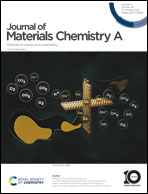A phosphorus-based olefin linked fully conjugated polymeric ligand for palladium-catalyzed trans-selective dicarbofunctionalization of internal alkynes†
Abstract
Phosphorus is rarely introduced in sp2 carbon (C![[double bond, length as m-dash]](https://www.rsc.org/images/entities/char_e001.gif) C) linked fully conjugated porous organic polymers (POPs) and has not been exploited in synthetically challenging and selectively competitive organic transformations. Herein, we synthesized a phosphorus-containing olefin-bonded fully conjugated organic polymer via a base-assisted Knoevenagel condensation reaction. Furthermore, we have metalated it with palladium chloride. Catalytically, this heterogeneous metal coordinated organic polymer has been employed in the challenging stereoselective multicomponent dicarbofunctionalization reaction on an unactivated internal alkyne using aryl iodides and aryl boronic acids as other reactants. Trans-selective tetra-substituted olefins were isolated with up to 96% yield and up to >99 : 1 E/Z selectivity for 34 examples. The catalyst tolerates enormous organic functional groups, including aldehyde, ketone, ester, nitrile, nitro, ether, halogen, alkyl, trifluoromethyl, and hetero-aromatic rings. Control and kinetic experiments were also performed to gain a mechanistic understanding. The polymer leveraging on multiple binding sites stabilized the palladium catalyst in different stages of the reaction that allowed the catalyst to be recycled for seven cycles with minimal product yield and selectivity loss. After recycling, the undamaged morphology of this polymeric material ensured further usability and made it more sustainable for catalysis. The turnover number (TON) and turnover frequency (TOF) are calculated to be 2561 and 43 h−1, respectively.
C) linked fully conjugated porous organic polymers (POPs) and has not been exploited in synthetically challenging and selectively competitive organic transformations. Herein, we synthesized a phosphorus-containing olefin-bonded fully conjugated organic polymer via a base-assisted Knoevenagel condensation reaction. Furthermore, we have metalated it with palladium chloride. Catalytically, this heterogeneous metal coordinated organic polymer has been employed in the challenging stereoselective multicomponent dicarbofunctionalization reaction on an unactivated internal alkyne using aryl iodides and aryl boronic acids as other reactants. Trans-selective tetra-substituted olefins were isolated with up to 96% yield and up to >99 : 1 E/Z selectivity for 34 examples. The catalyst tolerates enormous organic functional groups, including aldehyde, ketone, ester, nitrile, nitro, ether, halogen, alkyl, trifluoromethyl, and hetero-aromatic rings. Control and kinetic experiments were also performed to gain a mechanistic understanding. The polymer leveraging on multiple binding sites stabilized the palladium catalyst in different stages of the reaction that allowed the catalyst to be recycled for seven cycles with minimal product yield and selectivity loss. After recycling, the undamaged morphology of this polymeric material ensured further usability and made it more sustainable for catalysis. The turnover number (TON) and turnover frequency (TOF) are calculated to be 2561 and 43 h−1, respectively.

- This article is part of the themed collection: #MyFirstJMCA


 Please wait while we load your content...
Please wait while we load your content...